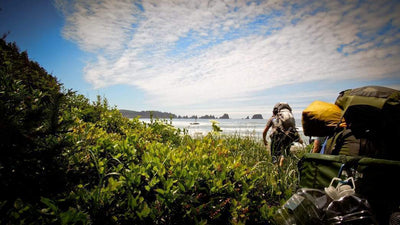8 Pro Tips for Spending a Year Living Out of Your Backpack
Taking a year to backpack abroad after college is an idea that just about every young person toys with at one point or another. After all, riding trains to places with unpronounceable names, tasting exotic foods, and meeting fascinating people in faraway places sure has more of a romantic appeal than growing your LinkedIn network and emailing out (unanswered) resumes and applications.
While I’d spent most of my young life vaguely planning a post-college backpacking trip, I spent senior year intensively laying out my grand escape.
After graduation, I’d pack my bag and spend about six months country-hopping around Europe. I knew that I wanted to move around and see as many places as possible, but that I’d need to balance that with enough structure to keep my parents relatively worry-free. Piecing together a trip of such magnitude was a rightfully daunting task, and it ended up taking the entire eight months to fully plan this grand European dirtbag getaway.
As a student, I knew that my budget would be impressively microscopic. This realization led me to seek out alternative means of travel, such as labor exchanges and stints of backcountry trekking. (The 130-mile Kerry Way Trail through the Irish countryside, and the 105-mile Tour de Mont Blanc circumnavigating Western Europe's highest mountain were both notable standouts for achieving the latter method.)

While there were times when I felt like a homeless drifter—usually while eating a sandwich on the sidewalk or sleeping in a train station—most of the time being a budget backpack traveler had nothing but perks. Trains and planes were easier to navigate with only a pack, cities became infinitely more accessible, and even hitchhiking became easier without lugging a huge suitcase.
For six months, my 50-liter pack held everything I needed—while also holding up to endlessly fickle conditions and being versatile enough to take into the backcountry for 100-mile sections at a time. Better yet, it usually weighed less than 25 pounds at any given moment.
In all, the trip was an enormous success. And I attribute much of this success to the minimalist approach taken and to the flexibility thus afforded. Here, as someone who learned a few things the hard way, I'll share some tips gleaned from my own rights and wrongs to help you find your way into the ultimate minimalist adventure.
1. Make A Plan, But Don’t Be Afraid To Deviate

This may seem like a no-brainer, but careful planning is key to helping your backpacking trip go as smoothly as possible. Getting off a plane in a country that’s not your own can quickly spur a moment of panic if you don’t know your next move.
Do your research in advance to know the best and most affordable way to get to your destination and to curb disorientation. Learn the currencies and exchange rates if you’re traveling abroad so as not to be taken by surprise when you accidentally purchase a seven dollar cup of coffee.
Your plan doesn’t have to be bullet-proof or set in stone, but having one at all will help you stay on track budget-wise and can help ensure that you get to see the major things you want to see.
2. Get The Gear You Need; Avoid The Gear You Don’t
There are some unquestionable essentials: a sturdy pair of shoes, a comfortable backpack, a waterproof tent if you’ll be camping, and some anti-bacterial undies for good measure. These items are must-haves.
However, don’t fall into the trap of thinking that everything you bring needs to be super nice and new. You’ll more than likely ruin most of the stuff you bring anyway (especially your clothes) and are apt to lose and replace things along the way.
3. Pack Smart

Simplify your packing process by making a detailed list, revising it, and consulting it often as you begin to fill your bag. For your clothing, think layers. You’ll be best-served by packable, lightweight pieces that can be combined for warmth. At times, you’ll probably find yourself wearing every item of clothing you brought and still shivering a little, but at least your pack will be lighter in moments like this.
Be realistic about what you bring along. Do you really need that extra flannel that's marginally more stylish than the one you've already packed? Probably not. Spend some quality time pouring over the contents of your pack; you’re going to get to know these items pretty well over the course of your trip.
Consider bringing something a little luxurious in case you start feeling a little, well, homeless. Maybe it’s an old favorite t-shirt, a bottle of nail polish, or a book that’s unrealistically large to carry in your backpack. A small comfort can go a long way at times.
4. Stay Organized
Try to fill your bag in the same order each time you pack it, and use strict compartmentalization within your bag. Pack similar items together using gallon Ziploc bags or stuff sacks: one for shirts, one for socks and undies, and so on. Consider a backpack with a secondary entry point for ease of access to those bottom-of-the-pack items.
These little tricks will help you know where everything is at all times and lessen the likelihood of a train station meltdown when you have to dig into the 48th liter of your 50-liter pack to locate your toothbrush. After a month or two of loading up your pack, it will become second nature, and you’ll be thankful (and a little proud) when you can easily locate even the smallest item in your backpack in record time.
5. Learn About Travel Regulations You Will Encounter

This is an area of trip planning that requires heavy research beforehand, especially if you’re traveling abroad. Make sure you have a full understanding of Schengen Zone requirements and any visas you might need. Leaving room for spontaneity in your travels is great, but it’s definitely not a good idea to wing it when it comes to visas.
Overstaying your welcome in certain countries or zones can result in serious consequences such as fines and bans, so make sure to count your days (literally) and make tracks when your time is up.
If you’re planning to do any camping along the way, learn about, and try to obtain, permits ahead of time. If you can’t, at least be aware of the area’s campgrounds and camping regulations.
6. Learn To Navigate Airports Like A Pro
Most airlines won’t let you take your fully-loaded backpack as a carry on, so plan to check your bag and then factor that additional cost into your budget. Checking your bag for a flight also means it will likely be majorly man-handled, so make sure to tuck in all your straps and zippers, or consider traveling with a cheap lightweight duffle bag to put your backpack inside of when you fly.
If you’re flying with a camp stove or some other cooking apparatus, always take it apart and clean it before putting it on the plane, and empty and rinse your fuel canister each time you fly.
7. Consider Non-Traditional Accommodations

If you’re looking to get away from hostels and off the beaten path, consider doing some sort of labor exchange during your travels. You can learn a new skill such as farming or cooking while saving money that you’d otherwise be spending on lodging. Organizations like WWOOF and WorkAway are great ways to become immersed in a culture, connect with other travelers, and experience people and places on a micro level that is hard to come by as a tourist.
8. Be Nimble; Things Won’t Always Go According To Plan

The most careful and detail-oriented planning in the world can’t ensure that your trip will unfold exactly as expected. Go ahead and make peace with the fact that things might be less than ideal at times. This way, when you inevitably get on the wrong train or you're wandering through a strange city at midnight looking for somewhere to stay, you can be confident that a misstep was bound to happen sooner or later. By planning for things to not necessarily go as planned, you’ll be a much happier camper when they don’t.
Written by Madison Eubanks for RootsRated.




